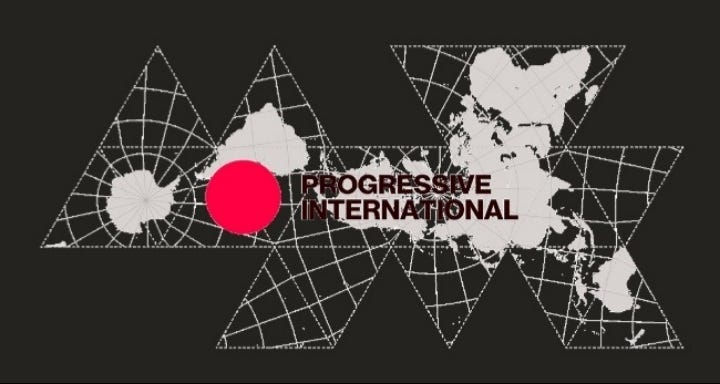BRICS ASCENDANT
Art of the Week: Symposium artwork by PI Design Director Gabriel Silveira
We live in a time of monsters. From bombs and blockades to secret detentions and mass deportations, the Trump administration has taken a bulldozer to the remaining pillars of the multilateral system. “American carnage” is now the country’s top export.
But this crisis of international order creates an unprecedented opportunity for its reconstruction. At the forefront of that process are the BRICS+.
Once an investment banker’s acronym, the BRICS have evolved into a geopolitical force operating at increasing scale, scope, and speed. With the recent inclusion of Egypt, Ethiopia, Indonesia, Iran, Saudi Arabia, and the UAE, the bloc now represents 45% of humanity and 40% of global GDP (PPP). Over 40 countries seek membership or association: a testament to its irreversible momentum.
The BRICS are no longer simply responding to global events; rather, the bloc is actively shaping them. The New Development Bank’s over $30 billion in infrastructure financing — from solar farms in India to urban transit in Brazil — could be just the beginning. The bloc is now deliberating proposals for new payment systems and technological partnerships between member states to challenge dollar domination and intellectual property restrictions on innovation.
For this year’s rotating presidency, Brazil’s President Lula da Silva has outlined a vision centred on six interconnected priorities: strengthening global health systems, building new financial architecture, advancing climate justice, creating ethical frameworks for artificial intelligence, reimagining security approaches, and strengthening BRICS institutions.
Lula sees these not as separate technical issues — but as parts of a unified effort to democratise the multilateral system and forge paths of sovereign development that respect both human dignity and ecological limits.
Our task now is to bring the Brazilian concept note to life: to convene the world’s leading scholars, diplomats, and policymakers who must bring fresh perspectives, incisive analysis, and pragmatic proposals that can ensure that Lula’s summit in Rio becomes an opportunity for genuine global transformation.
That is why the Progressive International is mobilizing to Brasilia this week for BRICS Ascendant, a two-day international symposium convened together with organizations such as Plataforma CIPÓ, the BRICS Policy Center, the Fundação Rosa Luxemburgo, the University of Brasilia, and the Brazilian Finance Ministry.
The symposium brings together over 50 delegates from over 20 countries from the BRICS+ countries and across the world, including visionaries like Naledi Pandor (South Africa’s Former Minister of International Relations), Wang Wen (Dean of the Chongyang Institute for Financial Studies), Richard Kozul-Wright (Former Director of UNCTAD’s Globalization Division), Dialo Diop (Vice President of Senegal’s PASTEF), Souad Aden-Osman (Executive Director of the Coalition for Dialogue on Africa), and Andrés Arauz (Former Governor of Ecuador’s Central Bank).
Over the course of two days in the Brazilian capital, these delegates will develop promising proposals across the six thematic areas set out by President Lula, from trade and investment to multilateralism and artificial intelligence — and along the way, forge a global network of government officials, civil society representatives, and international scholars to play an active role within the BRICS framework.
If you find yourself in Brasília this week, we warmly welcome you to join this historic gathering. The symposium is free and open to the public. For complete information about the program, participating delegates, and logistics, visit BRICS Ascendant — and help us chart a course out of this monstrous interregnum toward a truly multipolar world.
In solidarity,
The Progressive International Secretariat




